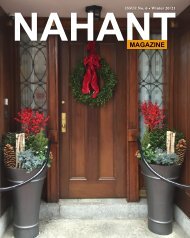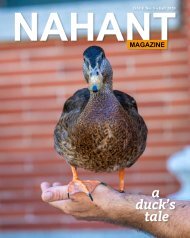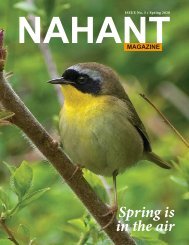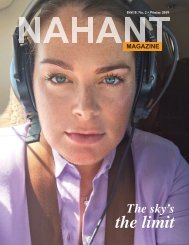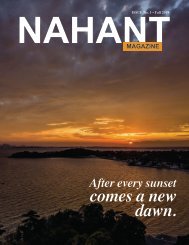Issue Four Summer 2020
Nahant Magazine is a lifestyle and community based publication focusing on local residents, businesses, real estate, culture, food, drink and more. It’s mailed free to every home in Nahant and distributed to businesses in the area on a quarterly basis.
Nahant Magazine is a lifestyle and community based publication focusing on local residents, businesses, real estate, culture, food, drink and more. It’s mailed free to every home in Nahant and distributed to businesses in the area on a quarterly basis.
Create successful ePaper yourself
Turn your PDF publications into a flip-book with our unique Google optimized e-Paper software.
When you are 11 years old, everything<br />
feels like a big deal. Baseball championships<br />
behind the Johnson School<br />
and hanging out with friends by the<br />
beach were both earth-shatteringly<br />
momentous to me. Jumping off the<br />
wharf for the very first time, then- a<br />
rite of passage for most Nahant kidswas<br />
a very big deal. Slowly, I stepped<br />
towards the edge of the wooden slats,<br />
unaware of my friends creeping up behind<br />
me to push me over the edge. Ice<br />
entombed my body as I suddenly realized<br />
I was flying helplessly through the<br />
air towards the frigid, unforgiving surface<br />
of the ocean. My heart raced, my<br />
eyes shut tight; I had no idea what lied<br />
below the surface and my body seemed<br />
to be rejecting the new and unfamiliar<br />
experience.<br />
Just as quickly as I had fallen into the<br />
water, my head popped above the surface<br />
of the tide, grinning wide in anticipation<br />
of another jump in my newfound<br />
favorite summer pastime. Yet,<br />
that singular experience sparked a tidal<br />
wave of questions for me about why<br />
people think and feel the things they<br />
do and how the human brain works.<br />
Eventually, I found that I had experienced<br />
some anxiety, and being the aspiring<br />
scientist I was, figuring this out<br />
led me to learn the intricacies behind<br />
how and why our minds trick us into<br />
intense moments of fear. As middle<br />
school ended and high school began,<br />
a fierce desire to help others with psychiatric<br />
conditions blossomed into a<br />
passion for neuroscience.<br />
This passion stayed mostly passive until<br />
last summer; adults always tell kids<br />
that they can’t make real change until<br />
they grow up, so getting good grades<br />
at school and excelling there seemed<br />
like the best way to ensure my future.<br />
Attending the Congress of the National<br />
Academy of Future Physicians and<br />
Medical Scientists last June empowered<br />
me to start pursuing my dreams in the<br />
present. I began contacting doctors to<br />
interview them for articles on teen mental<br />
health because I wanted every opportunity<br />
to learn about the brain and<br />
how it is affected by different things.<br />
I strive to be aware of others and what<br />
they’re going through to increase the<br />
quality of my relationships and the<br />
quality of life of humanity as a whole.<br />
As someone who has experienced<br />
some anxiety and who has seen my<br />
friends grapple with mental health issues,<br />
I have witnessed firsthand the<br />
effects that can have on someone and<br />
it breaks my heart. My concern for<br />
others frames the purpose behind my<br />
career choice. I refuse to standby suffering<br />
without taking action, and by<br />
researching neuroscience and better<br />
understanding the brain, I plan to<br />
completely eradicate panic attacks and<br />
even suicidal thoughts in adolescents<br />
in my lifetime.<br />
A year ago, I went through the motions<br />
of school without a second thought,<br />
my ambition simmering under the surface<br />
of my drive and compassion for<br />
others. I wanted to make a difference<br />
and I wanted to do it in the here and<br />
now, not ten years down the road after<br />
I had earned a degree. At the same<br />
time, I knew that I would have to develop<br />
skills in business and science research<br />
to be taken seriously by either<br />
community. No one was going to hand<br />
me the information; I had to learn how<br />
to read a research paper, synthesize the<br />
claims, and use the necessary software<br />
for biomedical mapping all by myself.<br />
When I heard about The Knowledge<br />
Society, a human accelerator for teens<br />
who want to change the world through<br />
scientific discovery, it seemed like the<br />
perfect opportunity to further my research<br />
into the brain and its function-<br />
29 | Nahant Magazine




